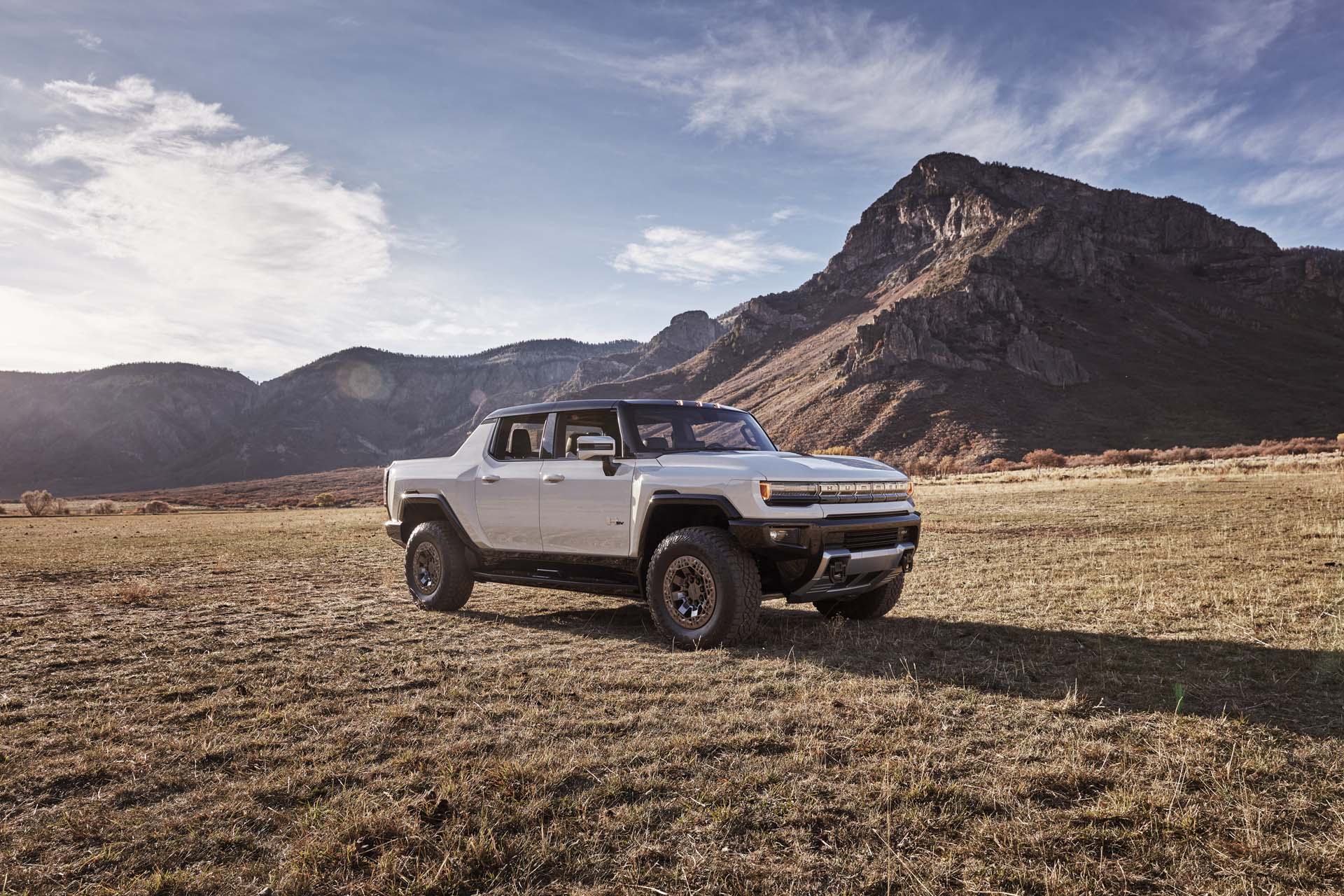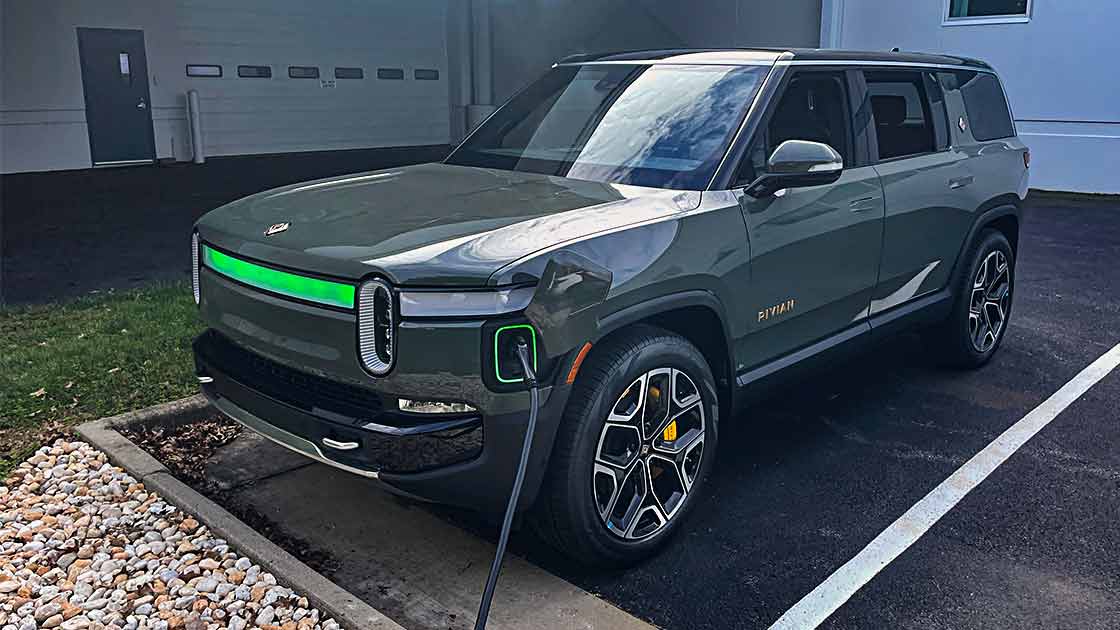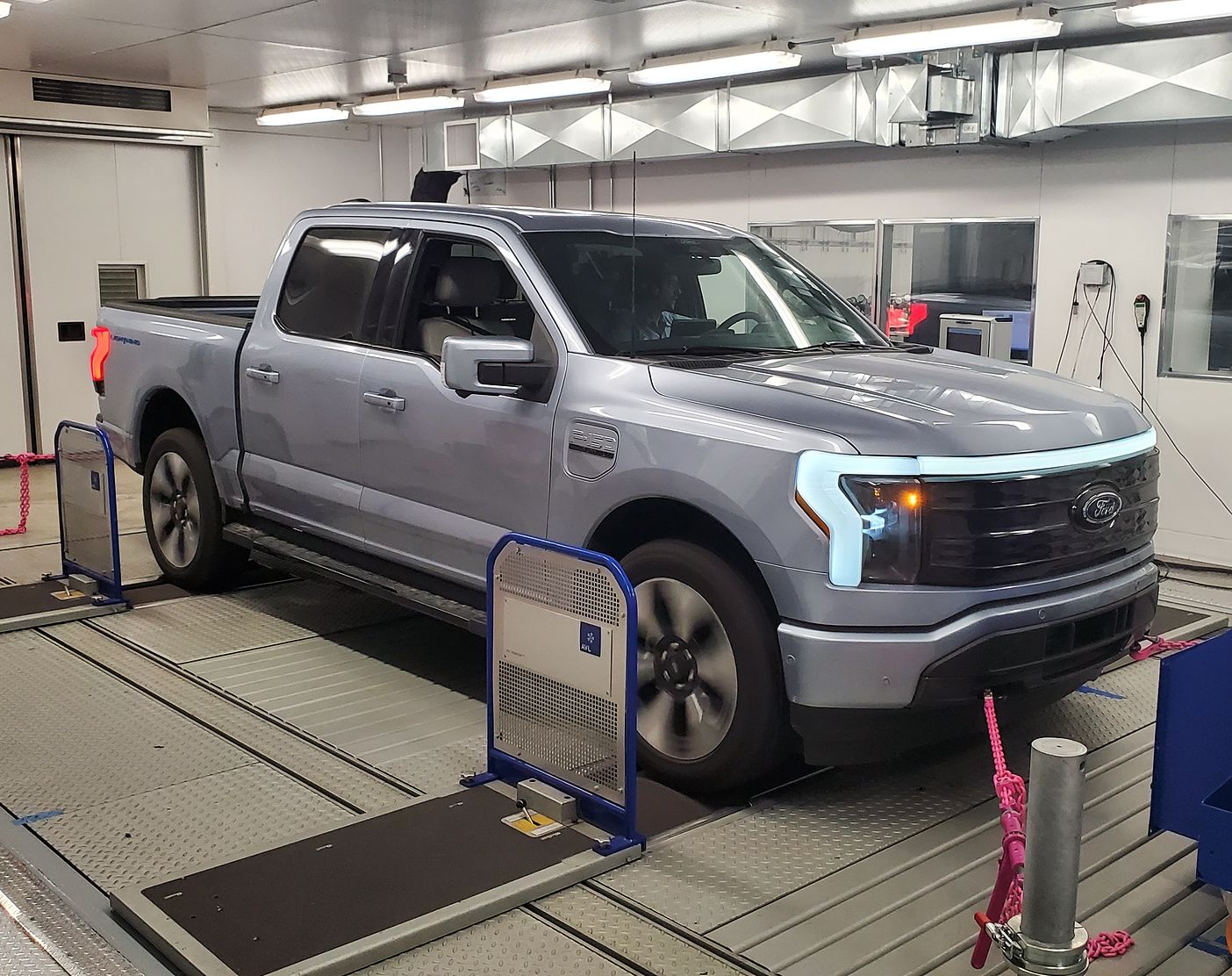So you finally got it! Too late, but better late than never.I'm with you man. I have 6 gas vehicles (if you count my lawn tractor), but the moment I mention buying one EV suddenly i'm a tree hugging hippy and completely unaware of what my own needs or desires in a vehicle are.
It's like the one percent rule. Apparently even if you heat your house with diesel, drive an 18 wheeler for a living, and freebase kerosene for fun, if you accidentally sat in a Tesla you're a bud light drinking target shopping greta idolizing xem/xer.
Electric Car News
- Thread starter Kyle
- Start date
glhs837
Power with Control
So, looks like 200 miles towing 10K, a dirty aero 10k at that. Nope, its not winter. Nope, its not 100 degrees in the desert. Yep, damn thing weighs 8,500 empty and costs 77K. For me, this thing is a no deal. Besides the fact that the two GMs I've owned soured me a little bit, this smacks too much of "Just keep throwing more metal into the body until its as strong as a framed version, and keep adding battery until we get the range we need."
Heck, I'm not sure they are making money even at this price point. That battery alone weighs almost as much as the wifes' Z4. (2900lbs to 3200)
So, this version is aimed at fleets. I'm not sure fleets are wanting to spend 77k. Even when accounting for fuel and maint savings, the value might not be there. The consumer version, two of which will be immediate sale are going to 90 and 106K respectively. Insane prices.
Will they sell? Sure. How many, I'm not sure at those prices.
I've been reading/hearing about needing to have a mileage tax to make up for the loss of gas taxes with EV's. A fairer tax (if there is such a thing) would be to tax based on axles and curb weight. Heavier vehicles cause more road damage and should pay more tax for maintenance/repairs. But delivery trucks get the extra weight allowance based on number of axles. Basically, a two axle/4 wheel EV would pay more because their battery packs are much heavier than a comparable size ICE vehicle, i.e., the more damage you cause the more you pay.

 www.cnet.com
www.cnet.com
Not to mention the safety for others on the road because of the weight differentials.

 www.greencarreports.com
www.greencarreports.com

 www.iihs.org
www.iihs.org
Maybe they can blame any extra deaths on guns.

Your electric car may weigh too much
EVs introduce a new calculus around tire noise, road wear and collision safety.
Not to mention the safety for others on the road because of the weight differentials.

Will the extra weight of EVs vs. ICE vehicles worsen road safety?
With American traffic deaths already at a 16-year high, safety officials haven't yet weighed in on the effects of a sudden weight gain in the vehicle fleet with the shift to EVs.

As heavy EVs proliferate, their weight may be a drag on safety
Electric vehicles are just as safe as other vehicles for their occupants, but unless we take action their weight will put other road users at risk.
Maybe they can blame any extra deaths on guns.
Last edited:
glhs837
Power with Control
I've been reading/hearing about needing to have a mileage tax to make up for the loss of gas taxes with EV's. A fairer tax (if there is such a thing) would be to tax based on axles and curb weight. Heavier vehicles cause more road damage and should pay more tax for maintenance/repairs. But delivery trucks get the extra weight allowance based on number of axles. Basically, a two axle/4 wheel EV would pay more because their battery packs are much heavier than a comparable size ICE vehicle, i.e., the more damage you cause the more you pay.

Your electric car may weigh too much
EVs introduce a new calculus around tire noise, road wear and collision safety.www.cnet.com
Not to mention the safety for others on the road because of the weight differentials.

Will the extra weight of EVs vs. ICE vehicles worsen road safety?
With American traffic deaths already at a 16-year high, safety officials haven't yet weighed in on the effects of a sudden weight gain in the vehicle fleet with the shift to EVs.www.greencarreports.com

As heavy EVs proliferate, their weight may be a drag on safety
Electric vehicles are just as safe as other vehicles for their occupants, but unless we take action their weight will put other road users at risk.www.iihs.org
Maybe they can blame any extra deaths on guns.
"Much heavier" is a bit of a misnomer. They mention them weighing in excess of 6,000lbs and mention the stupid Hummer which is over 9,000lbs. The bid problem right now is that legacy makers need to figure out how to lighten their products a bit more. A lot of the OMG, they weight a ton more is due o comparisons between ICE and EV versions of the same car. Conversion platforms always are hampered by inefficient design.

How much does a Tesla weigh? Comparing each model
Answering the popular question of "how much does a Tesla weigh?" with a detailed list of each of Tesla's current and future models.
 electrek.co
electrek.co
Teslas, at least, are not much heavier. The Model X weighs about the same as my 2006 SRT-8 Charger did. The Model X about what a loaded Grand Cherokee does. Or not much more than an Explorer.
I agree a weight/axle might be better though. It would incentivize makers to make more efficient choices. New Silverado EV weighs over 8,500lbs and has less capability than an ICE version costing less.
Misnomer? I would say 1000-2000 more pounds as quoted by the IISB is more of a fact of life than a misnomer. Stop trivializing facts. Thats called Lying. Pay the extra for the increased weight on the roads and quit complaining."Much heavier" is a bit of a misnomer. They mention them weighing in excess of 6,000lbs and mention the stupid Hummer which is over 9,000lbs. The bid problem right now is that legacy makers need to figure out how to lighten their products a bit more. A lot of the OMG, they weight a ton more is due o comparisons between ICE and EV versions of the same car. Conversion platforms always are hampered by inefficient design.

How much does a Tesla weigh? Comparing each model
Answering the popular question of "how much does a Tesla weigh?" with a detailed list of each of Tesla's current and future models.electrek.co
Teslas, at least, are not much heavier. The Model X weighs about the same as my 2006 SRT-8 Charger did. The Model X about what a loaded Grand Cherokee does. Or not much more than an Explorer.
I agree a weight/axle might be better though. It would incentivize makers to make more efficient choices. New Silverado EV weighs over 8,500lbs and has less capability than an ICE version costing less.
glhs837
Power with Control
Which EVs weight 2,000lbs more than equivalent ICE models? Specifics, please. I'll grant the current EV trucks except the Lightning. That one is pretty light, pretty much just like a regular F-150. Really, look us specific vehicles and compare. 200-300lbs isn't 2,000lbs. I'll gladly pay for whatever my vehicle weighs. My point was do research and don't let scaremonger articles decide how you feel.Misnomer? I would say 1000-2000 more pounds as quoted by the IISB is more of a fact of life than a misnomer. Stop trivializing facts. Thats called Lying. Pay the extra for the increased weight on the roads and quit complaining.
Glhs837 is saying OMG!! HE CAUGHT ME!!! DEFLECT!! DEFLECT!! DEFLECT!!Which EVs weight 2,000lbs more than equivalent ICE models? Specifics, please. I'll grant the current EV trucks except the Lightning. That one is pretty light, pretty much just like a regular F-150. Really, look us specific vehicles and compare. 200-300lbs isn't 2,000lbs. I'll gladly pay for whatever my vehicle weighs. My point was do research and don't let scaremonger articles decide how you feel.
glhs837
Power with Control
Caught? Were there things I said that were incorrect?Glhs837 is saying OMG!! HE CAUGHT ME!!! DEFLECT!! DEFLECT!! DEFLECT!!

AAA Tests Ford F-150 Lighting Range With A Heavy Load
AAA research finds that a near capacity payload reduces the driving range of the Ford F-150 Lightning by nearly 25%.
No One In The U.S. Really Wants To Buy Electric Vehicles
The problem with EVs was once limited supply, but it has now become demand. In the U.S., EVs are sitting on dealer lots for far longer than their gas-powered counterparts and piling up as buyers mostly continue to overlook fully-electric cars, as Axios reports. Despite carmaker lineups filling out with new EV models and the production thereof ramping up, people are still worried about charging and the pricing of EVs.
The latest reports from Cox Automotive indicate that car buyers are much more interested in EVs now than in the past: 51 percent of buyers who participated in a recent Cox survey are considering buying a new or used EV, which is up from 38 percent in 2021. And Cox says that EV sales will break the 1 million mark for the first time in 2023, with sales reportedly accounting for about 6.5 percent of the entire auto market in the U.S. so far.
Even so, it looks like EV supply is outstripping demand by a significant margin. The nation’s fully-electric cache is reportedly up by 350 percent this year, with nationwide inventory sitting at over 92,000 vehicles. That translates to a 92-day supply of EVs, which is almost twice the current average for gas-burning cars.
That would solve the road degradation issue, because where you will be going you won't need roads.I'll buy an electric Truck when it's powered by an onboard Mr Fusion Mobile Nuclear Reactor and Flux Capacitor.
Unsold electric cars are piling up on dealer lots
The auto industry is beginning to crank out more electric vehicles (EVs) to challenge Tesla, but there's one big problem: not enough buyers.
Why it matters: The growing mismatch between EV supply and demand is a sign that even though consumers are showing more interest in EVs, they're still wary about purchasing one because of price or charging concerns.
It's a "Field of Dreams" moment for automakers making big bets on electrification — they've built the cars, and now they're waiting for buyers to come, says Jonathan Gregory, senior manager of economic and industry insights at Cox Automotive.
Driving the news: Cox Automotive experts highlighted the swelling EV inventories during a recent midyear industry review for journalists and industry stakeholders.
EV sales, which account for about 6.5% of the U.S. auto market so far this year, are expected to surpass 1 million units for the first time in 2023, Cox forecasts.
A Cox survey found that 51% of consumers are now considering either a new or used EV, up from 38% in 2021.
Tesla’s rapid expansion, plus new EVs from other brands, are fueling the interest — 33 new models are arriving this year, and more than 50 new or updated models are coming in 2024, Cox estimates.
Yes, but: Sales aren't keeping up with that increased output.
Details: The nationwide supply of EVs in stock has swelled nearly 350% this year, to more than 92,000 units.
That's a 92-day supply — roughly three months' worth of EVs, and nearly twice the industry average.
The auto industry is beginning to crank out more electric vehicles (EVs) to challenge Tesla, but there's one big problem: not enough buyers.
Why it matters: The growing mismatch between EV supply and demand is a sign that even though consumers are showing more interest in EVs, they're still wary about purchasing one because of price or charging concerns.
It's a "Field of Dreams" moment for automakers making big bets on electrification — they've built the cars, and now they're waiting for buyers to come, says Jonathan Gregory, senior manager of economic and industry insights at Cox Automotive.
Driving the news: Cox Automotive experts highlighted the swelling EV inventories during a recent midyear industry review for journalists and industry stakeholders.
EV sales, which account for about 6.5% of the U.S. auto market so far this year, are expected to surpass 1 million units for the first time in 2023, Cox forecasts.
A Cox survey found that 51% of consumers are now considering either a new or used EV, up from 38% in 2021.
Tesla’s rapid expansion, plus new EVs from other brands, are fueling the interest — 33 new models are arriving this year, and more than 50 new or updated models are coming in 2024, Cox estimates.
Yes, but: Sales aren't keeping up with that increased output.
Details: The nationwide supply of EVs in stock has swelled nearly 350% this year, to more than 92,000 units.
That's a 92-day supply — roughly three months' worth of EVs, and nearly twice the industry average.
That whirring noise you hear is the resident spin cycle expert powering up.Unsold electric cars are piling up on dealer lots
The auto industry is beginning to crank out more electric vehicles (EVs) to challenge Tesla, but there's one big problem: not enough buyers.
Why it matters: The growing mismatch between EV supply and demand is a sign that even though consumers are showing more interest in EVs, they're still wary about purchasing one because of price or charging concerns.
It's a "Field of Dreams" moment for automakers making big bets on electrification — they've built the cars, and now they're waiting for buyers to come, says Jonathan Gregory, senior manager of economic and industry insights at Cox Automotive.
Driving the news: Cox Automotive experts highlighted the swelling EV inventories during a recent midyear industry review for journalists and industry stakeholders.
EV sales, which account for about 6.5% of the U.S. auto market so far this year, are expected to surpass 1 million units for the first time in 2023, Cox forecasts.
A Cox survey found that 51% of consumers are now considering either a new or used EV, up from 38% in 2021.
Tesla’s rapid expansion, plus new EVs from other brands, are fueling the interest — 33 new models are arriving this year, and more than 50 new or updated models are coming in 2024, Cox estimates.
Yes, but: Sales aren't keeping up with that increased output.
Details: The nationwide supply of EVs in stock has swelled nearly 350% this year, to more than 92,000 units.
That's a 92-day supply — roughly three months' worth of EVs, and nearly twice the industry average.
I always expected it was more of a grinding noise.That whirring noise you hear is the resident spin cycle expert powering up.
OccamsRazor
Well-Known Member
Personally, I have no idea HOW dealerships and car companies are surviving in the current market with FAR overpriced new vehicles. Both ICE and EVs. I guess people are still buying though which begs the question... Is the country REALLY hurting THAT bad with inflation?
glhs837
Power with Control
Less about desire than about the govt incentive program doing what govt incentives usually do, screwing up the market. Things like an 80k Hyundai and 110k Hummer are their own stupid things of course. It's all there in the article, of course, you just need to read and understand it. Or just regurgitate the headline, that works tooUnsold electric cars are piling up on dealer lots
The auto industry is beginning to crank out more electric vehicles (EVs) to challenge Tesla, but there's one big problem: not enough buyers.
Why it matters: The growing mismatch between EV supply and demand is a sign that even though consumers are showing more interest in EVs, they're still wary about purchasing one because of price or charging concerns.
It's a "Field of Dreams" moment for automakers making big bets on electrification — they've built the cars, and now they're waiting for buyers to come, says Jonathan Gregory, senior manager of economic and industry insights at Cox Automotive.
Driving the news: Cox Automotive experts highlighted the swelling EV inventories during a recent midyear industry review for journalists and industry stakeholders.
EV sales, which account for about 6.5% of the U.S. auto market so far this year, are expected to surpass 1 million units for the first time in 2023, Cox forecasts.
A Cox survey found that 51% of consumers are now considering either a new or used EV, up from 38% in 2021.
Tesla’s rapid expansion, plus new EVs from other brands, are fueling the interest — 33 new models are arriving this year, and more than 50 new or updated models are coming in 2024, Cox estimates.
Yes, but: Sales aren't keeping up with that increased output.
Details: The nationwide supply of EVs in stock has swelled nearly 350% this year, to more than 92,000 units.
That's a 92-day supply — roughly three months' worth of EVs, and nearly twice the industry average.
glhs837
Power with Control
Usually chargers like that are free to use for anyone, paid for by the govt. Of course, they are level 2 chargers so unless you are there all day, you're not getting much. But the County got a green press release..Noticed they put a charging station at the Board of Education in Cal. County. Do the employees only get to use it or is it open to the public?? And do the employees that use it, pay for the charge or does the BOE/county ?
Govt needs to stay out of this and let the market do its thing. Sink or swim.

